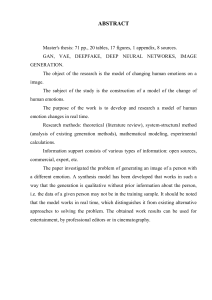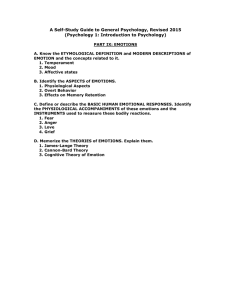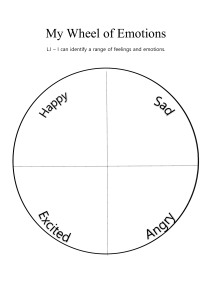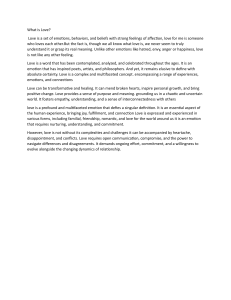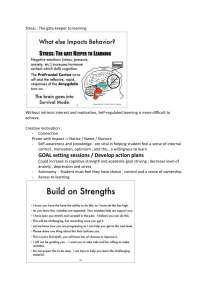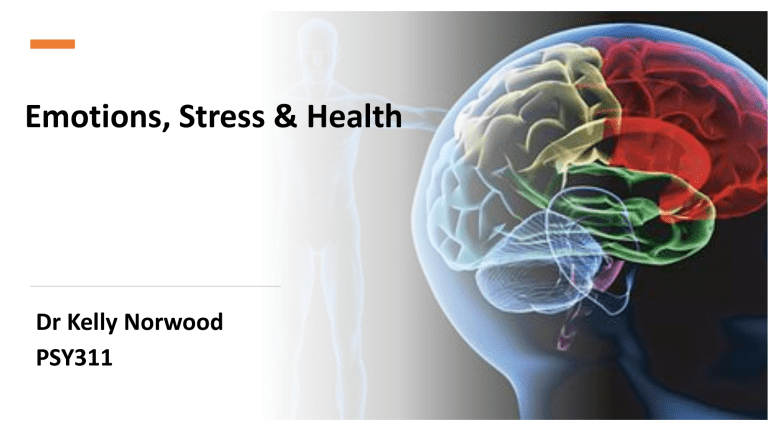
Emotions, Stress & Health Dr Kelly Norwood PSY311 What we will cover - Emotions - Components of emotions - Theories of emotions - Stress response - Stress & physical health - Stress & mental health What is Emotion? • Often called Feelings: • Love, hate, anger, sadness • Normally short in duration • Moods are longer in duration • Emotions are private experiences Emotions We all experience emotions There is not an overall agreement on: Definition of emotions How they should be measured Emotions are complex with both physical and mental components Emotions have the following components: subjective feelings physiological (body) responses Behaviour Subjective feelings • Feelings that we experience INDIVIDUALLY • Difficult to define & measure • Subjective feelings are hard to observe - emotions must be described • Each person's description and interpretation of a feeling may be slightly different • For example, two people falling in love Physiological (body) responses • Easy to measure • We can measure body responses: heart rate, sweat, respiration • We have similar physiological responses to the same emotions • For example, when under stress our bodies release adrenaline and this prepares the body for fight or flight • Happens regardless of gender or ethnicity Behaviours • Expressive behaviour is the outward sign that an emotion is being felt • Flushed face, facial expressions, tone of voice, rapid breathing, restlessness, muscle tensing • The outward expression of an emotion lets you know what someone is experiencing and helps social interactions Four components of Emotion Feelings SocialExpressive Emotion Sense of Purpose Physiological response Feelings component • Emotions are subjective feelings • Make us feel a particular way • Anger or joy • Meaning and personal significance • Vary in intensity and quality Physiological Response • Fight-flight-freeze • Autonomic nervous system (ANS) • Sympathetic & para-sympathetic • Prepare and activate behavior during emotion • Body prepared for action Sense of purpose • Give emotion its goal-directed force • Motivation to act • Cope with emotion-causing circumstances • Why people benefit from emotions • Social and evolutionary advantage Social-Expressive component • Emotion’s communicative aspect • Postures, gestures, vocalisations, facial expressions make our emotions public • Verbal and nonverbal communication • Helps us interpret the situation and how we react to events https://youtu.be/JtSP7gJuRFE Autonomic Nervous System During an emotional experience, our autonomic nervous system can calm or stimulates us: • Flight or Flight: Sympathetic response prepares body to meet a crisis • Rest or Digest: Parasympathetic calms body to aid in digestion 14 1. James-Lang Theory 2. Cannon-Bard Theory Theories of emotion 3. Schachter Two Factor Theory 4. Lazarus Cognitive-Mediation Theory Activity: which theory do you think is best? https://www.youtube.com/watch?v=qDYz32srgsU Stress: Introduction When exposed to threat physiological changes occur - the stress response/stress Stressors are experiences that induce the stress response -produce these physiological changes It is chronic stress that has been most frequently implicated in ill health Stress response o The amygdala (functions in emotional processing), sends a distress signal to the hypothalamus o Hypothalamus is like a ‘command centre’ for the brain – communicates with the rest of the body preparing you to fight or flee o Hypothalamus controls involuntary body functions - breathing, blood pressure, heartbeat Stress response • The hypothalamus activates the sympathetic nervous system by sending signals through the autonomic nerves to the adrenal glands • Adrenal glands pump the hormone epinephrine (aka adrenaline) and cortisol into the bloodstream • These are known as stress hormones • These changes happen so quickly that we aren't aware of them • That's why we can jump out of the path of an oncoming car before we think about what we are doing Stress and physical health When short-lived stressors may have positive effects and can be adaptive: - In a fearful or stress-causing situation, we can run away and save our lives - It can increase our alertness and help us perform better e.g. exams, sports However, stress can be maladaptive: - If it is prolonged (chronic stress), it increases our risk of illness and health problems - Psychological states can cause physical illness - When we feel severe stress, our ability to cope with it is impaired https://youtu.be/v-t1Z5-oPtU Stress and the Heart How does stress increase the risk of heart disease? - Stress alone does not cause heart disease but combining stress with unhealthy coping mechanisms might - For example: less exercise, increased alcohol and nicotine intake Can stress increase blood pressure? - Yes but it should return to normal after the stressful event/situation passes - Unhealthy coping mechanisms such as long-term unhealthy diet and drinking too much alcohol can cause long-term increases in blood pressure Can stress cause a heart attack? - Stress alone does not cause heart attacks but combining stress with unhealthy coping mechanisms might 23 Psychoneuroimmunology B lymphocytes fight bacterial infections T lymphocytes attack cancer cells and viruses Macrophages ingest foreign substances During stress, energy is taken away from the immune system making it vulnerable Lennart Nilsson/ Boehringer Ingelhein International GmbH 24 Stress and the immune system Research suggests that stress has adverse effects on the immune system https://www.ncbi.nlm.nih.gov/pmc/articles/PMC1361287/ Segerstrom and Miller (2004) conducted a meta-analysis reviewing approximately 300 studies of stress and immune system function: 1. Found that the effects of stress on immune function depended on the type of stress 2. Acute (brief) stressors: those lasting less than 100 minutes e.g. public speaking, an athletic competition, or a musical performance improved immune function 3. Chronic (long-lasting) stressors: caring for an ill relative or experiencing a period of unemployment, adversely affected immune function Stress and the immune system Not a straightforward relationship (Morey et al., 2015). https://www.ncbi.nlm.nih.gov/pmc/articles/PMC4465119/ Stress in early life: 1. Evidence for long-term effects on the immune system 2. Stress in early life can lead to a chronic inflammatory response Stress and aging 1. Naturally, aging comes with changes in our immune response to stressors 2. This can be due to physical and/or psychological responses 3. Telomere length can be reduced due to stressors Psychosomatic Disorders Psychosomatic disorders are diseases which include the body and mind. Psychosomatic means mind (psyche) and body (soma) Some physical diseases are identified as being made worse by mental factors such as stress and anxiety Chronic psychological stress increases the risk of developing (Oken et al., 2015): Cardiovascular problems Neurologic and psychiatric diseases such as epilepsy Parkinson's disease Multiple sclerosis Eating disorders, addictions Post-traumatic stress disorder (PTSD) Sleep difficulties Gastric ulcers and stress Gastric ulcers were one of the first medical disorders to be classified as psychosomatic. They are painful lesions of the stomach and duodenum, which in extreme cases can be life-threatening The view of gastric ulcers as the prototypical psychosomatic disorder changed with the discovery that they seemed to be caused by bacteria It was claimed that the bacteria Helicobacter pylori (i.e., H. pylori) are responsible for all cases of gastric ulcers except those caused by nonsteroidal anti-inflammatory agents such as aspirin This seemed to rule out stress as a causal factor Stress and depression What are the top 10 most stressful life events? Lifestyle choices that can increase stress: Excessive alcohol consumption Not getting enough exercise Smoking or using illegal drugs Working for long periods of time without taking a break Not eating a well-balanced diet Spending too much time watching television or playing video games Looking at a smartphone in bed, which can keep you from falling asleep The development of depression can be unrelated to stress Research into life events has found higher levels of significant stressors prior to the onset of major depressive episodes in patients compared to controls - 80% of depression cases were preceded by major life events (Hammen, 2005) Stress and depression One of the most widely accepted explanations of the cause of depression is abnormal brain chemistry Monoamine neurotransmitters: Serotonin Dopamine Norepinephrine Brain structures are affected also – hippocampus is approximately 25% smaller in the depressed brain Stress and Post-Traumatic Stress Disorder (PTSD) PTSD can develop after an extremely traumatic or stressful event Vivid flashbacks, nightmares & uncontrollable thoughts about the event - Road traffic accidents - Childbirth experience - Violent pnysical assaults, sexual assaults PTSD can develop immediately after a traumatic event, weeks, months or years later PTSD is estimated approx. 1 in 3 people who have a traumatic experience Stress and PTSD PTSD and the brain: 1. The amygdala is our natural alarm system 2. The pre-frontal cortex is the brake system and helps us to make decisions Not a good combination An overactive amygdala combined with an underactive prefrontal cortex creates conflict It’s like pressing on your car’s accelerator, when you don’t need to, only to discover the brakes don’t work This might help you understand why someone with PTSD might: (1) feel anxious around anything even slightly related to the original trauma that led to the PTSD (2) have strong physical reactions to situations that should not provoke a fear reaction (3) avoid situations that might trigger those intense emotions and reactions Stress and PTSD Unclear why some people develop PTSD while others don’t The exact causes of the condition are not clear - though some of the risk factors are understood Brain regions particularly involved are the hippocampus and the amygdala The amygdala (which processes fear) is hyperactive in people with PTSD, perhaps creating a kind of “false alarm” https://www.youtube.com/watch?v=5zhnLG3GW-8 • • • • • • • • Sp a rk ling Cock t a il Drink s Recep t ion Red ca rp et a rriv a l 3 Course M ea l Ent ert a inm ent includ ing a DJ Phot ogra p her La t e Ba r t o 1a m A p hot o boot h on t he night Sca n QR cod e t o book t ick et here
